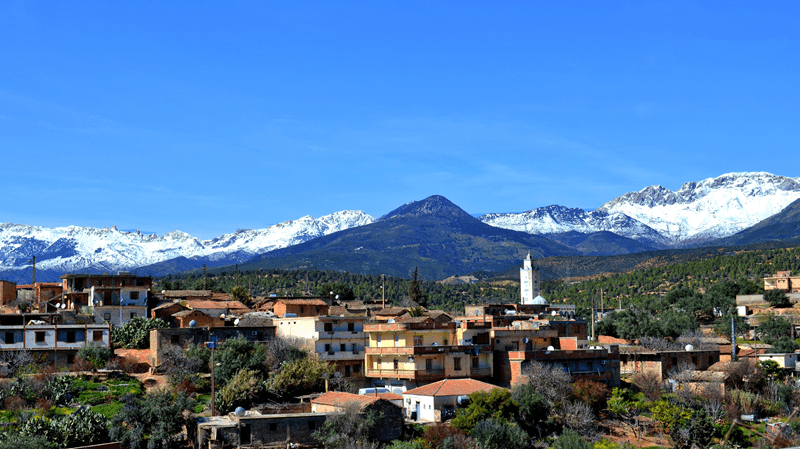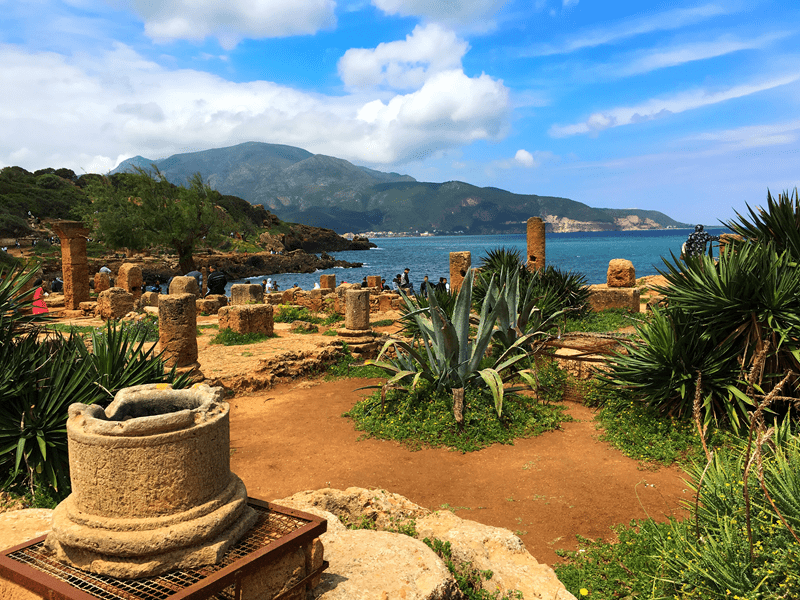A Quick Guide to Kabylie Travel Amidst Lush Mountains

If you've ever dreamt of a place that combines mountain majesty with traditional lifestyles, Kabylie is a destination worth visiting. Nestled along the Mediterranean coast in northern Algeria, Kabylie represents a realm of lush peaks, historic villages, and profound Berber, or Amazigh, culture. For U.S. travelers in search of authentic, out-of-the-beaten-path adventures, Kabylie presents a welcome respite from the crowds of tourists.
From hiking through the dramatic Kabylie mountains to wandering around Kabylie villages and soaking in the persistently beautiful culture of Kabylie, this guide will bring you right to the very heart of Kabylie travel. You'll find practical tips here and a sample Kabylie itinerary to help you plan an unforgettable journey.
Kabylie Travel Delights
Here is a glimpse of Kabylie culture travel.
1. Pristine Beauty of Kabylie Mountains
Most people imagine great expanses of golden dunes, or at least the iconic desert landscapes, when North Africa pops into their heads. Kabylie, however, is the polar opposite.
- The Kabylie mountains form part of the Tell Atlas range, which rises abruptly from the coast and is covered in oak, cedar, and pine forests.
- Peaks like Lalla Khedidja rise upwards above 7,500 feet to mark some of northern Algeria's highest points.
- Hiking in the Kabylie mountains throws the traveler right into the middle of some of the most dramatic scenery of the country: winding passes, cool valleys, and far-off views over the Mediterranean Sea.
- Come spring and early summer, the slopes are aflame with wildflowers and olive groves, while in winter, snow hangs at higher elevations. There are countless trails, numerous opportunities for camping and trekking, or simply taking in the mountain silence.
For the nature-loving traveler, traveling in Kabylie is an invitation to slow down, breathe fresh air, and get in touch with the wild.
2. The Living Soul of Kabylie Culture
The real heart of travel to Kabylie, though, is its people and their traditions.
- One of the largest Berber-speaking communities in North Africa, the Kabyle have managed to preserve their identity, language, and culture against centuries of colonial influence and modernization.
- It is a culture deeply rooted in community, hospitality, and craftsmanship, values still central to the way of life today.
- Artistic expression is everywhere to be seen in Kabylie: amongst the crafts, hand-painted pottery, the weaving of rugs, and the making of silver jewelry stand out as manifestations of pride in the local heritage.
- Women from Kabyle are especially well-known for their many-colored dresses and symbolic tattoos, which, in the past, served them as identification or means of indicating their social connections.
- Traditional music in Kabylie consists of flutes and tambourines, telling about love, struggle, and resistance.
Engaging with Kabylie culture isn't about staged performances; it is about genuine warmth: guests are often invited in for mint tea, homemade bread, and heartfelt conversation. There are a few places in the world where traveler and host interact as genuinely as here.
3. Charm of Kabylie Villages
The villages, snuggled among hills and ridges, represent the heartbeats of Kabylie. Their stone houses, narrow alleys, and terraced gardens reflect centuries of harmonious communion with nature.
- Every village has its rhythm: early-morning markets, olive harvests, and lively festivals that trace the seasons.
- History is alive in the villages of Kabylie: communal fountains where the family gathers, small squares shaded by olive trees, and workshops where artisans carve wood or weave baskets.
- Some villages-Tizi Ouzou and Béjaïa, among others-have grown into small towns yet still retain their old-world soul; others remain tucked deep in the mountains, almost untouched by modern tourism.
- This is a sense of community that you might just feel when you're staying in a guesthouse or even just passing through a market.
One reminder of what traveling is supposed to be is the slow, meaningful current of life in these villages.
Building the Perfect Kabylie Itinerary
A well-planned Kabylie itinerary balances adventure with cultural immersion. Although every different traveler has a different pace, in five to seven days' time, one will be able to enjoy the mountains, coast, and villages without hurrying.
Day 1 - Arrival and Introduction
Arrive in the capital of Algeria, Algiers, and drive to Tizi Ouzou, which is considered to be the gateway to Kabylie. It takes three hours of driving. On your first day, you can rest from the long traveling and get used to the pace here. Taste your first dishes of Kabyle cuisine: lamb on the grill or some couscous and tajine cooked with local spices. Then in the evening, stroll around the centre of the town and chat with locals.
Day 2 - Into the Heart of the Mountains
Start your Kabylie mountains exploration today. Head for the Djurdjura National Park, a sanctuary of cedar forests, caves, and mountain streams.
- Go for a short hike or take a scenic drive to one of the high passes.
- Have a picnic overlooking the valley with some items: freshly baked bread, olives, and fruits are local favorites.
- The air is different here, crisper and invigorating. Spend a night in some small mountain guesthouse, enjoy a simple home-cooked dinner, and then go star-gazing far from city lights.
Day 3 - Villages of Kabylie
Take a fully guided day's excursion to a number of villages in Kabylie: early departure, then drive on curved roads lined with olive groves and terrace hillsides; stop at markets where villagers sell honey, olive oil, and handwoven scarves; have coffee with the locals and learn a bit about their daily lives.
As many travelers would attest, it's not the sights but the people that are most memorable when traveling in Kabylie. Take your time and listen to the stories while village life unfolds in its rhythm before you.
Day 4 - Cultural Immersion
- Spend your day deep in the culture of Kabylie, visiting a cooperative or cultural center that keeps Berber crafts and music alive.
- You may even catch traditional pottery being made, or even take a lesson in how to prepare couscous with methods from times of old.
- Why not catch a local show if you can? Kabyle folk music is full of poetic lyrics and rhythmic beats and is very soulful.
You could be in luck and travel during festival time, where you get to see that community spirit at its most fervent: weddings and harvests are normally accompanied by drumming, dancing, and laughter that permeate the air.

Day 5 - Coastal Kabylie
Head to Béjaïa, where the Kabylie mountains meet the Mediterranean.
- The road will wind along forested slopes before opening onto blue coastal views.
- Take a walk along the cliffs, visit the old port, and relax on one of the quiet beaches.
- Combining mountain and sea into one day makes this a favorite for many travelers.
If time allows, take an overnight stop here. The seafood is just fresh, and the sunsets are unforgettable.
Day 6 - Reflection and Relaxation
- Take the day to return to some of your favorite spots or simply to relax.
- You can return to a favorite village, do some craft shopping, or hike one last mountain trail.
- For many visitors, this is a reflective day, a time to take in the beauty and kindness that they have experienced since their arrival in Kabylie.
Day 7 - Farewell and Departure
Travel back toward Algiers for your onward flight. The memories of the landscapes, laughter, and shared meals will stay with you a long time after this journey has ended.
What makes Kabylie culture special?
Appreciation of travel to Kabylie essentially calls for an understanding of how this region is different in culture compared to anywhere else in North Africa.
- First, there's language. The Kabyles speak Tamazight, a Berber language quite different from both Arabic and French. You'll hear locals greet each other with "Azul". Many speak French too, and it makes communication for English speakers who know a few words of French quite manageable.
- The role of community runs deep as villages are organized around solidarities and collective responsibilities; councils of elders often make decisions that affect the larger community and maintain a form of grassroots democracy that dates to centuries past.
- Third, the crafts and cuisine are expressions of identity. There is the olive oil from Kabylie, famous everywhere for its pure content; the traditional bread prepared in clay ovens fills every home with its smell. Hand-painted pottery decorated with geometric Berber symbols makes perfect souvenirs, not just items but stories in clay.
Finally, the music and poetry of Kabylie speak to a people attached to their land. The words of the songs most often celebrate freedom, nature, and love, never forgetting the spirit of the mountains.
Tips for the U.S. Travelers Planning to Visit Kabylie
Here are a few tips.
- Timing: The best months to travel to Kabylie are between March and June, and between September and November, with mild temperatures and ideal conditions for hikes. Transportation: A rental car allows flexibility in seeing the Kabylie mountains and the more remote Kabylie villages. The roads are paved but winding; drive carefully and enjoy the scenery.
- Currency: The local currency is the Algerian dinar. Bring cash, since small shops and village markets seldom accept cards.
- Accommodation: Choose locally owned guesthouses or small hotels for real hospitality. Many are family-owned, and homemade meals are often included.
- Cultural Sensitivity: Kabylie is a very hospitable place, yet conservative on certain counts. Dress modestly, do not photograph people without permission, and learn some greetings in either Tamazight or French.
- Food and Drink: Try couscous with lamb, grilled sardines, and olive-oil-based dishes. Always accept tea when offered—it’s a gesture of friendship.
- Safety and Comfort: The region is safe and peaceful. However, travel with updated local guidance and let your accommodation know your daily itinerary if you are hiking or driving into remote areas.
- Connectivity: In smaller villages in Kabylie, there will be limited access to the Internet. Think of it as a chance to unplug from the world and enjoy its slow rhythm.
The Deeper Meaning of Kabylie Travel
In essence, traveling in Kabylie means discovery: landscape, heritage, and humanity. You will not find big resorts or organized tours here.
- What you will find are mountain paths taken at dawn by shepherds leading flocks, family dinners where laughter is louder than all language barriers, and peace, which modern life rarely offers.
- The mountains of Kabylie teach patience and wonder; the villages of Kabylie teach simplicity and connection, while the culture of Kabylie teaches resilience-that beauty and identity have been preserved, no matter all the pressures of time.
- Visiting Kabylie is a rediscovery of what travel used to mean: curiosity, respect, and exchange. It is not about striking off some landmarks from your list; it's about meeting a place that still breathes authenticity.
Conclusion
For US-based travelers who look for an adventure with some substance, Kabylie travel offers something extra special. The towering mountains of Kabylie, the timeless villages, and the enduring culture together offer a world unlike any other in North Africa. Craft your Kabylie itinerary with thoughtfulness, take your time, and let the rhythm of the region guide you.
Any meal shared, any trail walked, and any conversation held would remind you of one thing-that true travel is not about distance but a connection. And once you make it to Kabylie, you'll then understand why many who travel there leave their heart in its mountains and among its people.
This content was created by AI

